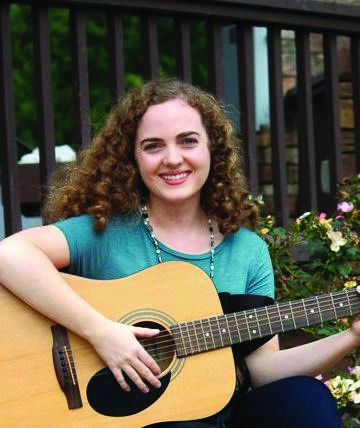

Claire Morison
Lena Claire Morison grew up in the Tri-Cities surrounded by music. She is the daughter of Jane Morison who leads Mountain Empire Children’s Choral Academy. She knew she wanted a career in music from an early age.
“I had originally planned on pursuing a career in music performance, but while I was in college, I realized that I wanted to work more directly with people and use music to support their needs in a more applied setting. Music therapy seemed to be a great field in which to accomplish this, and the more I saw music interact with and benefit others in this setting, the more interested I became.When I found out about neurologic music therapy and applying music to address different neurologic needs of individuals, I was absolutely hooked. I love science, and I love music, and neurologic music therapy was the perfect marriage of the two for me.
“I also had a personal experience where I experienced some of the therapeutic power of music. When I was a teenager, I saw my grandmother, who had fairly advanced dementia, respond to music and become lucid in response to my mother singing one of her favorite hymns to her. This was particularly powerful to me, and definitely helped spur me on to pursue work in this field,” she says.
Music therapy has neurologic applications that support rehabilitation of speech, motor needs and cognitive needs in individuals who have experienced stroke, brain injury and Parkinson’s Disorder. Music therapy can be used to improve quality of life and memory recall for older adults with dementia and Alzheimer’s, and to support individuals in hospice care. It can be used to support neurologic and developmental needs in individuals with developmental disabilities such as Autism Spectrum Disorder, Cerebral Palsy, Down Syndrome, etc. It can be used to support emotional and mental health in a variety of ways and has also been used to treat PTSD with veterans.
In the U.S., individuals must be trained in an accredited music therapy program in either a four-year undergraduate program or a graduate equivalency program to call themselves music therapists. This education includes thorough musical training, as well as coursework in biology and anatomy. Following the completion of accredited coursework, music therapist students complete a six-month clinical internship before they sit for their board-certification exams set by the Certification Board for Music Therapists. Certain states require additional licensure before board-certified music therapists are allowed to practice in their state. Those who have not completed these educational requirements and have not passed the CBMT exam are not allowed to call themselves a music therapist.
Music therapists frequently need additional training and certification to practice in some areas, and several applications of music therapy require significant training at an advanced level.
Morison completed her undergraduate training at Belmont University, Nashville, Tennessee, completed her clinical internship at The George Center for Music Therapy in Roswell, Georgia, and obtained her MT-BC credentials in February 2018. She also renewed her credentials as a Neurologic Music Therapist in 2020. She is pursuing higher education in the field through the Master of Music Therapy program at Appalachian State University, Boone, North Carolina.
She worked at The George Center for Music Therapy for about two and a half years, where she facilitated individual and group music therapy sessions with children, adolescents and adults with neurologic and developmental disabilities. She also facilitated grief-support music therapy groups and early childhood development classes and helped to co-facilitate Any Dream Will Do, a performing arts class for teens with developmental disabilities. She also helped co-found and direct Singing with Parkinson’s, a therapeutic choir for adults with Parkinson’s Disease, and helped facilitate The Giving Tree program, a music therapy program that used music to build connections between students at local preschools and residents at assisted living facilities.
“Music therapy is such a vast and complex discipline, it’s hard to fully describe it and all its applications, as well as the different nuances of training and education that music therapists need to practice with certain populations. I tend to describe it in very clinical terms because of my neurologic music therapy training, but it is a treatment that also has the potential to be vast, deep, incredibly emotional and incredibly healing. Participants/clients need no musical skill or training to participate in or benefit from music therapy, although musical skill or training is not a barrier to treatment either.
“On a personal level, I feel incredibly blessed to have been led to this profession; using music to connect with individuals and to see the progress, healing and growth that comes from the use of music in the context of a therapeutic relationship is a joy and a privilege,” she says.
To find a music therapist, visit the American Music Therapy Association, which has a directory of music therapists. You can also email the organization for help finding a local MT at findMT@musictherapy.org, or you can search for music therapists on Psychology Today.
“It’s good to keep in mind also that since the beginning of the pandemic, many music therapists have incorporated telehealth into their scope of practice, so just because a therapist is out of driving distance does not necessarily mean that they are unavailable for a session,” Morison says.
She is not practicing full-time while she works on her master’s degree. However, she is providing part-time services through the Appalachian State University Music Therapy Clinic and through individual subcontracting work. She can be reached at morisonlc@appstate.edu.
For more information about music therapy, visit www.musictherapy.org.